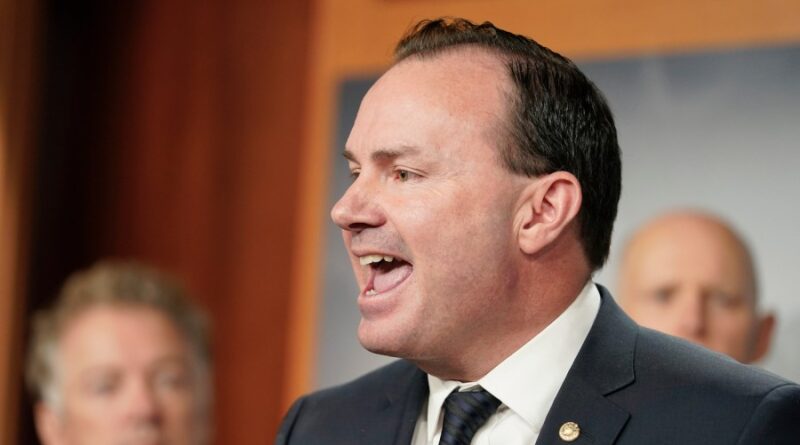Conservative senator lays out proposals for post-McConnell reforms

Sen. Mike Lee (R-Utah), the chair of the conservative Senate Steering Committee, has laid out a list of proposed reforms designed to ensure that the next Senate Republican leader does not have the same power as outgoing Senate GOP Leader Mitch McConnell (Ky.).
McConnell has served as Senate GOP leader since 2007, making him the longest-serving party leader in the history of the U.S. Senate. He will step down from the leadership at the end of 2024, but he will serve out the remainder of his Senate term, which lasts through 2026.
Lee and other conservatives, including Sens. Ted Cruz (R-Texas), Ron Johnson (R-Wis.), Eric Schmitt (R-Mo.) and Josh Hawley (R-Mo.), have grown increasingly frustrated with McConnell’s leadership style over the years, particularly his support for omnibus funding bills and legislation to increase the federal debt limit.
Anticipating his party will win back control of the Senate in November, Lee is proposing to limit the next Senate Republican leader’s ability to block rank-and-file conservative senators from getting votes on amendments to major bills, such as year-end omnibus spending packages or bipartisan deals of farm subsidies, military aid to Ukraine or any number of other priorities.
“One of the fundamental issues we face is that our current processes are shutting out the people we represent. Most Americans would be shocked to learn that their senators often cannot offer amendments to legislation,” Lee wrote in a letter to Republican colleagues laying out his proposed reforms.
“The result? Today, the Senate no longer functions as the ‘cooling saucer’ of our constitutional republic, but instead serves as a rubber stamp for rushed an often flawed legislation,” he continued.
Lee noted that the practice of filling the amendment tree, whereby the Senate majority leader blocks colleagues from getting votes on amendments to a pending bill, was pioneered in earnest by former Senate Majority Leader Harry Reid (D-Nev.) but has since become common practice in the upper chamber.
The Utah senator has endorsed a proposal sponsored by Schmitt and Sen. Chuck Grassley (R-Iowa) that would require three-fourths of the Senate GOP conference to agree to any effort to block amendments by filling the amendment tree.
“This would give individual members more say and restore the Senate as a place of genuine debate and negotiation,” Lee argued in his letter.
He noted that Republicans could still opt for the procedural tactic, if there is enough support within their conference to do so, to block Democrats from getting votes on amendments.
Lee is also calling for senators to have at least four weeks to debate and amend omnibus spending bills.
“We all know the pressure that comes with last-minute votes on massive spending bills that are dropped on our desks hours before a deadline. This is not how the Senate should operate,” Lee wrote.
Providing four weeks for review and debate, he argues, would “allow us to craft better laws and give the American people a real opportunity to engage in the legislative process.”
Lee is also calling for the next Senate Republican leader to “propose a structured process and floor schedule for considering appropriations legislation” so the annual spending bills are less likely to get balled up in an omnibus package at year’s end.
Senate Republican Whip John Thune (S.D.) is vying with Sen. John Cornyn (Texas), the previous GOP whip, and Sen. Rick Scott (R-Fla.), the former chair of the National Republican Senatorial Committee, to succeed McConnell as the next Senate Republican leader.
And from a broader strategic perspective, Lee wants the next Senate GOP leadership team to put more thought into advancing Republican policies by stating goals that would be ratified by the entire GOP conference at the start of each year.
“This would give us a shared vision to rally around,” he argued.
Lee believes that having general policy goals mapped out in advance would help the next leader craft “specific strategies for achieving Republican victories in connection with must pass legislation.”
And the conservative senator wants to end the practice of Senate GOP leaders whipping for bills that do not have the support of a majority of the Republican conference.
“The Republican floor leader and whip should whip for or against a bill or nominee only with the support of the majority of the conference,” Lee wrote.
“Where there is consensus of the conference, this would empower leadership to advocate for those priorities. Where there is not consensus, this would allow Republican senators to work amongst themselves to build consensus for their priorities,” he argued.
Lee said these reforms would both empower individual senators and also strengthen the hand of GOP leaders in negotiations with Democrats, as it would ensure that whatever priorities they push have strong buy-in from the rest of the Republican conference.
“This is our moment to reaffirm and strengthen the greatest features of the Senate and set a new course for our conference,” he wrote.

